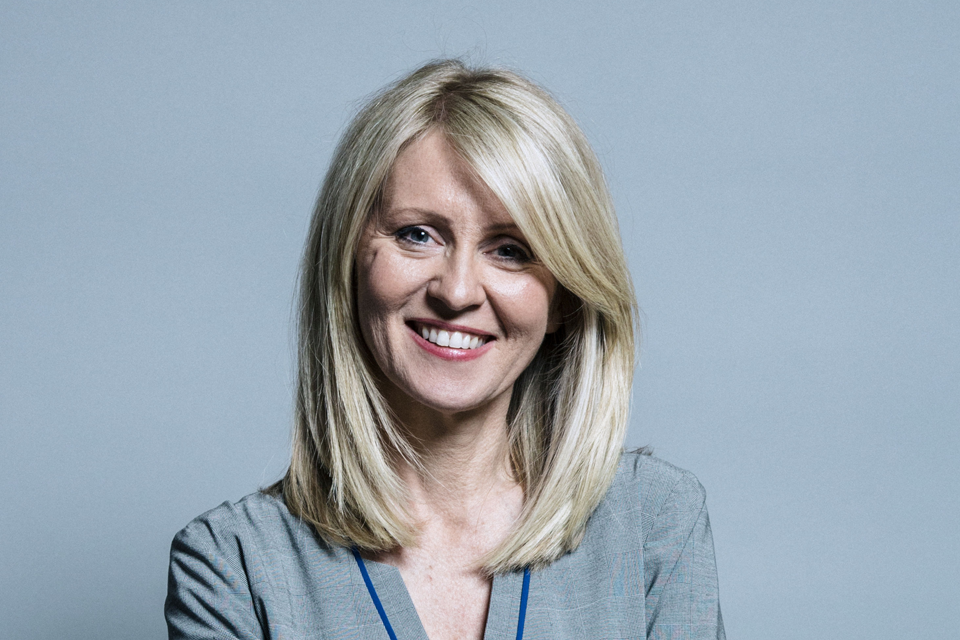Measuring child poverty: a consultation on better measures of child poverty
A speech by Esther McVey MP, Minister for Disabled People.

Thank you all for coming today to feed into the Government’s consultation on measuring child poverty.
As MP for Wirral West, I know the passion and expertise with which your organisations work with children in poverty in the North West. I share that passion with you, and today is your chance to be the voice of our local children on a national stage.
I’ll ensure that your views are heard in Westminster and taken into account. The Government knows that the knowledge needed to tackle child poverty doesn’t lie in Whitehall, it lies with people like you.
This is why it’s great to be here at Our Place today. Youth centres like this play a big role in improving the lives and life chances of our children and young people. With 32 per cent of Knowsley’s children living in poverty, these services really are invaluable.
As Minister for Disabled People, I’m particularly impressed by the services offered here to young people with disabilities, allowing them to integrate more fully into the youth community here.
The child poverty consultation was launched on 15 November 2012 by Work and Pensions Secretary, Iain Duncan Smith, and Schools Minister, David Laws.
It’s a real example of the coalition commitment to thinking seriously about child poverty. Two years on, the coalition remains strong, determined and driven to improve children’s lives.
Here in Merseyside, 27 per cent of children live in families with below 60 per cent of median income.
Of course, income matters.
But in my work with children and young people, I’ve seen time and time again that poverty isn’t simply about income. As frontline workers and advocates for children in poverty, you know this even better than me.
But last year, statistics showed that 300,000 children in the UK were moved out of poverty. This wasn’t because of improvements in their standard of living or life chances. Instead, it was due to a fall in national median income which pushed the poverty line down.
Those children who moved over the poverty line had no more experiences, no improved opportunities, and no better lives than they did before.
This shows that we need a better measure of child poverty, one that won’t change simply because of the state of the economy.
This consultation is about addressing the real drivers of child poverty.
The income-focussed measures in the Child Poverty Act can’t capture the experience of growing up in poverty, or the barriers to escaping this poverty. A better measure will widen our perspective to show what life is really like for children in poverty today.
Through this we can try to make changes that really transform children’s lives. We need to look at what causes poverty, and so help people find a way out of that poverty.
Worklessness is one of these causes.
The coalition is united on the importance of work. Work is central to wellbeing. It’s one of the best ways to increase independence and self-esteem, and is central to someone’s identity.
As Minister for Disabled People, I’ve seen how innovative schemes enabling vulnerable groups to re-enter the workforce can have a real effect on people’s lives.
This is echoed throughout the Government. Getting people back to work and helping them live independent lives really is a coalition priority.
A record number of people are in work and one million private-sector jobs have been created since the Election. The number of people out of work has also fallen by 82,000 in the last quarter. We know times are tough and there’s still more to be done, but we are making progress.
Not everyone, of course, is well equipped to find work. That’s why areas like parental skill level are included in this consultation.
Some parents, keen as they are to work, are constrained by a lack of qualifications or experience.
Children need their parents to be role models if they are to get these qualifications and experiences themselves.
And small businesses need these qualifications and experiences to function.
If we can address low parental skill level then we can better tackle poverty for the whole family, both parents and children.
Of course, families matter in other ways as well.
The family stability dimension of this consultation shows just how big an impact family breakdown can have on some children’s lives It’s not just economic - where some children are drawn into parental conflict they’re more likely to suffer poor outcomes, doing less well at school and being more likely to run away from home. There’s the issue of role models too.
Similarly, high levels of unmanageable debt can be a burden on the whole family. A family trapped in spiralling debt may not have the money left to meet their basic needs, but this is something that the current child poverty measure doesn’t take into consideration.
Then there’s education. Children whose hopes and dreams are stifled by a failing school simply don’t have the same chances as children who are supported every step of the way by inspirational teachers and role models.
These role models can come from school, but they’re also found all over. Employers, the family, the local community - they’re all fundamental in our children’s lives. And that’s why places like OurPlace are just so important.
Whether it’s worklessness, debt, ill health, family instability or educational failure, across the Coalition we’re taking action to address the barriers that hold children back.
A better measure of child poverty will enable us to better address the causes and consequences of poverty and lead to real transformative change.
Of course, money matters, and no measure of child poverty will overlook this. But other things matter too, and this is what the Coalition is hoping to illustrate in its new measure of child poverty.
Thank you.